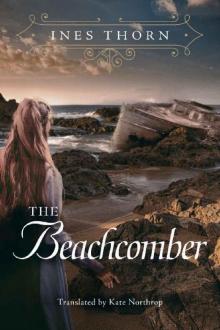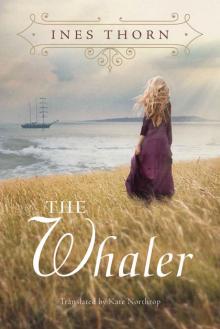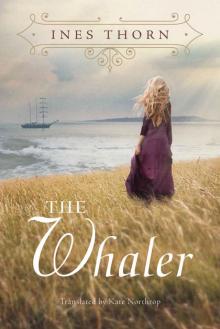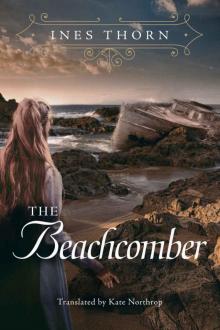- Home
- Ines Thorn
The Beachcomber Page 2
The Beachcomber Read online
Page 2
She turned and lay down in the sand. The sky was an unobscured milky blue. The air smelled of heather, fish, and salt. A few gulls cried, but Jordis ignored them. She was looking for the two ravens that were the god Odin’s companions and informed him about what people were doing. She was certain that Odin would send the ravens to her on this special day, but she waited in vain. Seagulls and wild geese circled over the island, and on the Wadden Sea shore, oystercatchers and herons teetered through the mudflats revealed by the receding tide. Farther out, where the water was deeper, she could see a few eider ducks, and close to her a common redshank shook its brown-and-white feathers, while a black-tailed godwit poked in the sand near her feet, searching for something to eat. It seemed to take forever for the twilight to spread its gray veil from the sea to the sky.
Jordis was excited. She had so many questions for the rune oracle she didn’t know where to begin. Should she ask if her future would bring riches? Should she find out if she would finally get the new dress she wanted? She didn’t know. She knew only one thing: she wouldn’t ask who she was going to marry, because there was one young man she liked, and that was her deepest secret. Even her best friend, Inga, didn’t know about it.
The moon was a wan curve on the horizon when Jordis ran out of patience and hurried home, home to the whitewashed Frisian house with the blue-painted door decorated with flowers.
“Come and sit at the table,” her grandmother bade her as Jordis breathlessly entered the kitchen. Jordis’s blue dress was dirty at the hem and full of gorse thorns, and her blue eyes glowed with curiosity. “Wash your hands first, clean yourself up a little, and bring a couple of lights. Not the whale-oil lanterns tonight. Take the two beeswax candles instead.” She stroked her granddaughter’s silvery-blond hair and smiled. Then she checked that the front door and the curtains were closed.
What she was about to do with the runes was forbidden on Sylt. Anyone who believed in the old gods, even a little, risked being brought before the council by the pastor on a Sunday to be cast out of the village community. And someone like Jordis’s grandmother, who came from Iceland, the land of elves and fairies, a country where hot water bubbled out of the ground and mountains spat fire, was definitely not to be trusted. So her grandmother locked the door, kept her sacred rituals a secret, and never spoke of them.
Etta opened the secret drawer hidden beneath the scrubbed kitchen table, and took out a little black velvet bag tied with a golden cord. She loosened the cord and shook the twenty-four rune stones onto a white linen cloth. Each had been carved from a piece of whalebone and inscribed with a runic character, which had been rubbed with blood and let dry to make it stand out against the white bone.
“What is your question?” Etta asked.
Jordis sat across from her, her hands folded neatly on the table, her long hair tied back with a ribbon.
“Will you do the Celtic cross reading?” the girl asked, but Etta shook her head.
“You’re too young for the Celtic cross. You haven’t lived long enough. The runes that make up the cross represent the past, the present, and the future. Your past is too short compared to your future. But I can read the Norns for you. They show the past a bit, but mostly the future.”
Jordis frowned thoughtfully, but then she nodded. The Norns. In the old Norse religion, they were the three goddesses of fate. They lived at the foot of Yggdrasil, the World Tree. They wove past, present, and future into the branches of the ancient ash tree.
“Have you thought of a question?” her grandmother asked.
Jordis hadn’t been able to think about anything else. She’d been trying to figure out what to ask for weeks. But now everything seemed to be happening too fast. She hadn’t found a question. Certainly not one that could be answered by the consultation of the Norns. That’s why she’d wanted the Celtic cross with its ten runes, instead of the Norns with only three.
Jordis swallowed and looked at her grandmother. “What will my life be like?”
Etta hesitated, then smiled. “A clever question.”
Jordis took the rune stones in both hands and closed her eyes. She shook them gently together and cast them onto the white cloth.
“Pick three stones, one after another,” her grandmother said. “Keep your eyes closed and use your left hand, which comes from your heart. Take plenty of time to make your choice.”
Jordis’s hand hovered over the stones, as though waiting for a rune to draw her toward it. Then she touched her first stone with a single finger.
The first stone chosen represented Urd, the goddess of what once was. It would tell her where her roots lay, and what inheritance she carried inside of her. Jordis tapped a second stone, which lay quite close to the first. That was the stone of Verdandi, the Norn of what was coming into being, or the present. Jordis took her time to choose the future stone. With great concentration, she let her hand glide above the runes, trying to feel which one of them called to her. Finally, she paused, and her finger touched the stone for Skuld, the goddess of what will be.
She listened to her grandmother pick up the stones and turn them over to reveal their runes, but kept her eyes closed. Her grandmother was silent, and suddenly Jordis didn’t know if she wanted to see what was in her future. As long as everything seemed possible, she could dream big dreams, unconstrained by place, time, status, money, or fame. But after her grandmother read the runes, some of her dreams would have to die, and Jordis didn’t know if she was ready to give them up.
“Are you ready?” her grandmother asked.
A shudder went down Jordis’s back. Etta’s voice had changed; it was no longer loving and soft, but cool and dispassionate. As though there was something important to discuss.
“Just a moment,” Jordis whispered.
Etta laughed softly. “That won’t change anything.” But she stayed silent until Jordis took a deep breath.
“Now I’m ready,” she said finally.
She opened her eyes and saw that the first rune, representing her past, was Ehwaz.
“This rune symbolizes the horse.” Etta closed her eyes and recited the verse that belonged to the rune:
“The horse is the joy of nobility.
Warriors take pride in its hooves’ agility
And rich men discuss its deeds.
It comforts the restless in times of great need.”
Etta was silent for a moment before she continued. “Ehwaz is the rune of Sleipnir, Odin’s steed. Its herb is ragwort. This rune indicates the ability to travel great distances. Do you know what it means?”
Jordis shook her head.
“Ehwaz is the rune of your past. It shows that your roots come from somewhere far away—not from here on Sylt. It tells us your roots lie with the roots of your mother and your grandmother. You are Icelandic. Like us.”
Jordis grimaced. “I was born here on Sylt. My father was from Sylt. Why can’t I have roots here like everyone else?”
Etta sighed. “Life isn’t that simple. You were conceived in Iceland. Your home is the land of hot springs, burning mountains, and icy seas. That’s neither good nor bad; it just shows us that in your past, your fate was determined by the Island of Ice.”
For some reason, the thought made Jordis shudder. The same way she used to shudder when her mother, Nanna, had told her tales from Iceland. Jordis thought it would be difficult to live in a country whose fate was determined by elves and fairies, a country called Iceland because it was so cold for most of the year. She thought she understood why her mother had followed Jori the whaler to the island of Sylt. They had met when Jori came ashore in Iceland with his ship’s crew to stock up on provisions during a whaling voyage. Nanna hadn’t meant to fall in love with the man from Sylt, but she’d known she couldn’t choose who to fall in love with. So she’d gone with him.
“What does the second rune say?” Jordis asked.
“Let’s stay with the first one for a bit,” Etta said. “This also tells you that you already know the man yo
u’re going to marry.”
“And . . . who . . . who is it?” Jordis’s eyes were glowing with curiosity, even though she’d promised herself she wouldn’t ask that exact question.
“Well, I don’t know that either. If you feel something special for a boy or man, you’ll know yourself. Now then, we’ll look at the second rune.”
She picked up the rune and considered it for a moment before continuing. “This rune is Dagaz, the day.” Then Etta closed her eyes and recited the rune poem:
“Day is the herald of the gods.
Beloved of all, its glorious light
Brings hope and joy to rich and poor,
Of service to all, shining bright.”
“Is there anything else?” Jordis asked.
“It belongs to Ostara, the goddess of the dawn and spring. Its herb is the cowslip, and its bird is the skylark.” Etta smiled. “At first glance, this fits you best.”
“Why only at first glance?”
“Dagaz also represents the weave of fate from the beginning of time to eternity. That means anything you do now will have repercussions for the rest of your life. You have to be careful. But it’s also the rune of new beginnings. Something old and dark is ending, and you will start on a new path. Growth is promised to you.”
Etta watched her granddaughter as she stared at the rune, her eyes aglow. “Are you satisfied with that?”
Jordis nodded. “Something new is beginning. But is this new thing good or bad?” she asked.
“I don’t know. I only know that it will help you to grow. Shall we read the last rune? The rune of your future? Maybe it will help us see if the new path will be good or not.”
“Yes.” Jordis had put her hands in her lap, and her fingers were twisted in the hem of her dress. She closed her eyes again, afraid that the last rune, the rune of her future, might be one she wouldn’t have wanted.
Then she heard Etta laugh softly, and opened her eyes with relief. “What is it?”
“Berkanan, the birch tree. A very good rune. This is the poem:
“The birch bears no fruit, but life springs from her leaves.
New growth begins without fertile seeds;
Her glorious branches are laden with green;
Her lofty crown reaches the sky like a queen.”
“Which herb goes with it?” Jordis asked.
“Motherwort. That’s what we’ve always called it, but I don’t know what it’s called here on Sylt.” Her grandmother’s brow furrowed. She’d lived on Sylt for a long time, but she still didn’t know all the Frisian names for plants. Although she spoke and understood the dialect of North Frisian spoken on Sylt, which was influenced by English and Danish from the mainland, there were still some gaps in her knowledge. “Will you find out what they call it for me?” she asked her granddaughter.
“Yes, of course. But go on.”
Etta cleared her throat. “The birch is a carnal rune. It represents what a man and a woman do after they get married, in the darkness.”
“What do they do?” Jordis asked.
“You’ll learn when it’s time. Don’t forget, my dear, this is the rune of your future. And I see children in your future. Proud, healthy children.”
“And will there be a husband to go with them?” Jordis asked.
Before Etta could answer, they heard a voice from outside.
“Jordis, where are you? Come quickly!” The shout was immediately followed by a knock at the door. “Jordis, can you hear me?”
There was an impatient rattling at the door handle, and Etta rushed to collect the rune stones, poured them hastily back into the black velvet bag, and slipped them back into the secret drawer under the kitchen tabletop. Then she blew out the beeswax candles, got the two whale-oil lamps that she usually used in the kitchen, and lit them.
“Go on, let her in,” Etta said. “But not one word about what we were doing.”
Jordis hurried to the door, slid the bolt out, and opened it. Outside was Inga, her best and only friend.
“What were you doing?” Inga asked. “Why were the shutters closed?”
Jordis shrugged, trying to look casual. “What do you think? We just finished dinner a little early, that’s all.”
Inga tilted her slightly elongated nose and sniffed the air. “Oh, I smell beeswax. Do you have something to celebrate?”
“It’s my birthday today,” Jordis replied, suddenly feeling a little embarrassed.
Inga laughed. “I know that. Why do you think I came?” Her brow creased. “But on Sylt we celebrate your saint’s name day, not your birthday. You’re the only ones who do that.” Her voice was accusatory and her face serious, but then she smiled. “Oh, it doesn’t matter if it’s your name day or your birthday. The important thing is, you’re happy.” She straightened her back. “And I didn’t forget your birthday.”
She slipped past Jordis and went into the kitchen, greeted Etta, and sat on the kitchen bench. Then she reached into a rough cloth bag hanging at her waist, and pulled out a package. “This is for you,” she said. Her cheeks reddened a little.
Jordis sat down next to her friend and carefully unwound the linen cloth the gift was wrapped in. In it was an intricately carved wooden cross the size of her hand.
“A cross?” Jordis said with surprise.
“Yes. I noticed that you didn’t have one over the door of your house like everyone else. So I wanted to give you one, so the Lord will watch over you.” Inga glowed with happiness.
Jordis glanced at Etta, who nodded almost imperceptibly. Etta embraced the visitor warmly. “You’ve given the cross to Jordis, but I thank you for it too. We’ll hang it up over the door tomorrow.”
Jordis stood up and hugged her friend too, and Inga smiled. “I even went to the church and had it blessed.”
“By your father?” Jordis asked. “Did you tell him it was for me?”
“Of course. He knows you. He confirmed you,” she said casually, as though it were obvious. But Jordis and Etta both knew that her confirmation had been anything but obvious. “She’s a witch’s daughter,” the pastor had said when Etta had brought her granddaughter to sign her up for confirmation lessons. “She should never have been christened. And her mother . . . ! She committed suicide, and there is no greater sin.” He had wanted to send her away, but Etta had fought for her. Etta actually didn’t care whether Jordis was confirmed or not, but she knew that it was important for her to be as much like everyone else on Sylt as possible. As a child, Jordis had suffered greatly after her mother’s suicide. The other women had called their children back into their houses when Jordis had walked by. No one had been allowed to play with her. No one had even wanted to be her friend, because her mother had committed a mortal sin. And even though Jordis had been born on Sylt, she was still considered a foreigner, with her Icelandic grandmother and her Icelandic mother, both of whom had bright white-blond hair and eyes as blue as glacial ice. Only after Inga, the pastor’s daughter, had befriended her, for reasons that Jordis still couldn’t fathom, did the other children begin to talk to her. Inga had been her entry into Rantum society, what there was of it. Without her, Jordis would be an outsider, completely alone.
“Did your father say we should hang it over the door?” Jordis asked.
“Yes, that’s the tradition.” Inga narrowed her eyes and seemed a little annoyed. “Don’t you want to?”
“Oh, yes, of course we do!” Etta took the cross from Jordis’s hand and examined it. “We’ll find the perfect place for it the first thing tomorrow morning. People believe in the Lord God in Iceland too. They build churches and ask for his protection.”
Inga nodded and scuffed her feet self-consciously under the table. “Did you know that we’re old enough to marry now?” she said, turning to Jordis.
“Yes, I know. Now we’re finally both sixteen years old.”
“So, do you have your eye on someone?” Inga asked.
Jordis didn’t like secrets, but something held her back, wa
rning her to keep quiet. Still, she felt as though she hadn’t thanked Inga enough for the cross, so she said, “Yes, there is someone I like. What about you?”
Inga bent over the table and leaned toward Jordis. Her eyes narrowed slightly. “Who is it, then?” she asked, without answering Jordis’s question. “Please, tell me!”
Jordis shook her head.
“Oh, please! We’re best friends, after all!”
Suddenly there was a scuffing sound from under the table. “Oh, I stepped on something,” Inga said, and bent down to look. She reappeared immediately, holding a rune in her hand. Jordis realized with shock that it was Berkanan, her future rune, which Etta must have dropped when Inga had called to be let in. Now Inga held it triumphantly aloft, but she looked confused. “What is this?” she asked with a cadence of suspicion in her voice.
“It’s just a piece of whalebone I wanted to make a spoon out of. I planned the engraving as a decoration, but before I finished, it broke.” Etta leaned against the door frame with her arms crossed. Her voice was serious, and she pushed an escaped lock of her silvery-gray hair out of her face. “Give it to me, I’ll toss it into the stove.” She held out her hand for the rune.
Inga examined it closely and then looked with narrowed eyes at Jordis, who was forcing a smile. “No, don’t burn it. It’s pretty. I’d like to have it.” She put it in her pocket.
An expression of fear flashed over Etta’s face. “It’s nothing worth keeping,” she said. She reached over to a shelf that held colorfully painted plates, and took one down and handed it to Inga. “Have this plate instead, it’s much nicer. Look, it shows a view of the church of Amsterdam.”

 The Beachcomber
The Beachcomber The Whaler
The Whaler The Whaler (The Island of Sylt Book 1)
The Whaler (The Island of Sylt Book 1) The Beachcomber (The Island of Sylt Book 2)
The Beachcomber (The Island of Sylt Book 2)